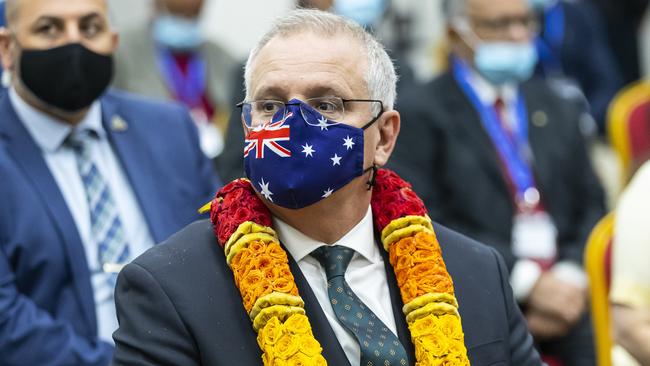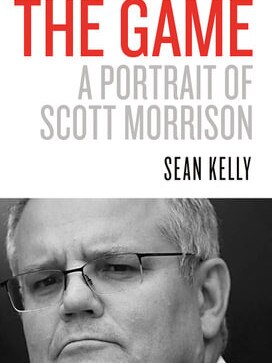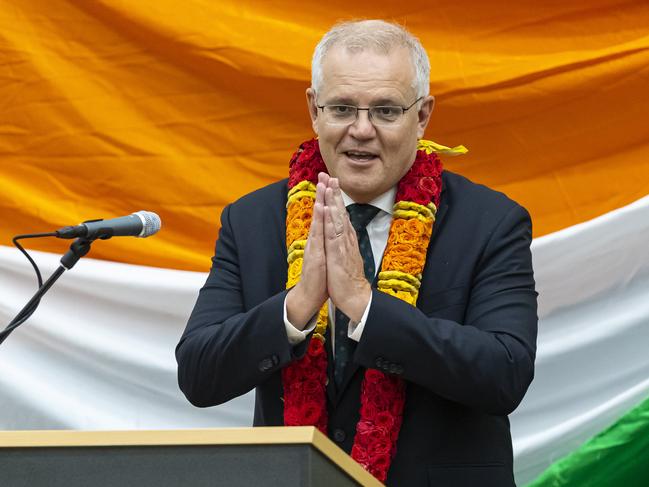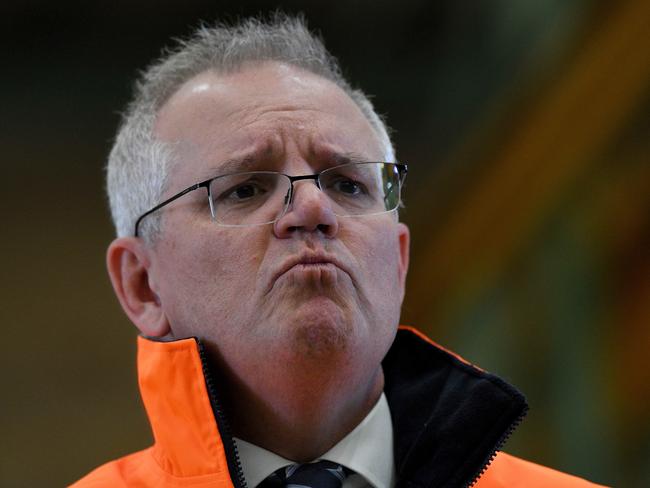Sean Kelly has a fair old go at Scott Morrison in The Game
The most damning words in former Labor staffer Sean Kelly’s examination of Scott Morrison turn out to be the PM’s own.

Richard Nixon once told a confidante that to advance his political career he would undertake any task and make any sacrifice. “Anything,” he said, “except see a shrink.” Everything was endurable save self-scrutiny. The sentiment came to mind while reading The Game, Sean Kelly’s unsparing new appraisal of Scott Morrison. How would Morrison react to the holding up of such an unflattering ‘portrait’?
Repeat his “I am the prime minister” jingle with its unspoken addendum “and you’re not”? Invite us to celebrate that Kelly had not been shot before shifting the conversation to those Sharkies? One of Morrison’s chief capacities, Kelly shows, is for the pretence that what displeases him does not exist.

Kelly concedes that when asked to write The Game, he was hesitant. Morrison was simply too boring. The book is an outgrowing of a profile that Kelly wrote for The Monthly, and at times exhibits signs of padding – the gleanings from Janet Malcolm and Joan Didion, the quotations from Lewis Carroll and Ford Madox Ford, the invocations of Sigmund Freud and Benedict Anderson. He can overegg his analysis, too: sometimes a man cooking a curry is just that.
But as a former speechwriter for Kevin Rudd and Julia Gillard, Kelly is sensitive to tics of personality and techniques of messaging. He avoids the temptation to paint Morrison in the florid hues of a coal-for-brains ideologue or a cunning flim-flam man; rather is he intrigued by the sheer nullity of Morrison’s presentation, its reliance on vacuous self-brandings such as “authentic” and “pragmatic”, its dependence on shrivelled public expectations and codependence with colour-by-numbers journalism. Kelly’s epigrammatic formulations make for ready quotation. Morrison’s maiden speech: “Nothing more than a series of attempts to take every possible position.” Morrison’s exuberant religiosity: “A way to articulate values, to make it clear he had them, while forcefully pushing back on any suggestion he should be held to them.” Morrison’s characteristically passive locutions: “Bad things seem simply to happen, without the clear intention of anyone involved.”

His political playbook: “Briefing against those who criticised his government, arguing that fault lay with others, obfuscating about who knew what when, using bureaucratic language to smother an issue, trying to wait the controversy out, returning to stock phrases.” Best of all, perhaps, are Kelly’s set pieces, such as Morrison at Cobargo pumping the unwilling hands of bushfire survivors, and Morrison going full MAGA on refugees during the debate over the Medical Evacuation Bill (“They may be a paedophile, they may be a rapist, they maybe a murderer, and this bill would mean we would just have to take them”).
Ironically, in fact, the most damning words in The Game are not Kelly’s but Morrison’s. When Kelly quotes lengthily from Morrison in press conferences and in parliament, first as immigration then as prime minister, you cannot but be amazed at the belligerent vacuity, the brisk dissembling.
Morrison has prospered strangely by a kind of assumed ineffectuality. The Betoota Advocate’s famous epithet, “Scotty from Marketing”, cuts both ways: it positions Morrison as both the mediocre marketing manager full of cloying enthusiasm for stale concepts, and the corporate survivor who rises without trace by being never quite bad enough to get fired.
Morrison’s everyday stock in trade is, indeed, the crushingly banal, the exhaustingly inert: “Why do you have to tax people more to tax others less?”; “We want see women rise. But we don’t want to see women rise only on the basis of others doing worse”.
Occasionally, this shades into the sinister. “If you have a go, you get a go,” makes for an appealingly optimistic slogan until you grasp how it excludes those who cannot have a go and thereby get a go. It is not, as Kelly says, “some good-faith promise of support for those who make an effort”; rather it says: “If you didn’t get a go, that’s on you.”

When you read rather than merely hear the prime minister in action, what stands out is the intent not simply to avoid or to negative questions, but to annihilate them, as though they were never uttered. His answers are often prefaced, Kelly notes, with a pause that signifies “the considered decision to avoid communicating meaning of any sort”, and followed with the tight smile of an inferior debater rather too pleased with a rebuttal.
At his worst, Morrison defaults to a truculence that is almost childish. “I’m not going to spend money on global climate conferences and all that sort of nonsense,” Morrison reassured Alan Jones on becoming prime minister; compelled to last month, he sat there as sullenly as a schoolboy in detention.
The Game might have been more tightly edited. Kelly is prone to needless descriptors that add nothing to his argument while being neither precise nor memorable, such as Peter Dutton (‘a former police officer from Queensland with a thin, bald head that some likened, with unkind accuracy, to a potato’) and Kerry Packer (‘a slimy, charismatic bully of an impressive obesity that cartoonists loved to mock’, the last part of which I’m not sure is true anyway).
The charge that Morrison treats politics as a game, which provides Kelly with his title, also rings a little hollow. The “game of politics” is a tired notion, invoked by everyone from Winston Churchill to Hillary Clinton; nor is there anything trivial or lighthearted about Morrison’s approach; he is in dull, relentless earnest. It feels like Kelly missed an opportunity to explore careerism in politics, the hollowing out of the major parties, the Michael Rimmeresque triumph of the transactional and unillusioned, in evidence at every level.
To oppose Morrison, could Australia really do no better than another middle-aged white male known by a knockabout nickname? Maybe the whole system needs therapy.
Gideon Haigh’s latest book is The Brilliant Boy: Doc Evatt and the Great Australian Dissent (Simon & Schuster)
THE GAME: A PORTRAIT OF SCOTT MORRISON



To join the conversation, please log in. Don't have an account? Register
Join the conversation, you are commenting as Logout